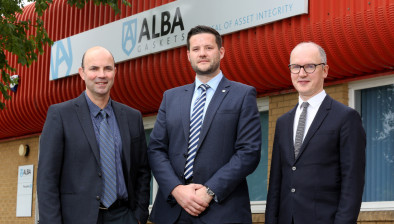MHA: Scottish manufacturers’ wish list mirrored in new UK industrial strategy

Stuart MacPherson – Audit and accounts director at MHA Aberdeen
The UK government’s new Modern Industrial Strategy has been met with cautious optimism, as its key aims appear to align with the pressing needs of Scotland’s manufacturing sector, according to accountancy firm MHA.
Over the weekend, MHA revealed the findings of a survey that asked manufacturing leaders what they hoped politicians would prioritise in the strategy.
It showed that despite challenges relating to cyber security, tax increases, skills shortages, energy costs and regulation, the vast majority of respondents expected their businesses to grow between 3-10% in the next year.
However, they recognised a need for political action around increasing supply chain options (47.9%), upskilling existing staff (45.1%) and investment in strengthening IT systems (38%).
Now the UK government, in its 10-year Modern Industrial Strategy published today, said it would “explicitly” partner with the Scottish Government to support growth sectors north of the border.
Stuart MacPherson, audit and accounts director, based at MHA in Aberdeen, said: “The strategy has outlined a UK strategy that focuses on a strong framework, ambitious green targets and investing in skills for the future.
“While the strategy does not have a standalone chapter on Scotland, it is evident that the key areas being highlighted by the strategy are those areas which the responses to the survey were focused on.
“The MHA survey highlighted a number of key points including developing R&D to create efficiencies (both in processes and outputs) which feed into the broader Green Industrial Strategy, closing the skills gap with a key need to engage new skilled staff for the long term (particularly through apprenticeships) and access to markets.
“A number of responses highlighted issues with accessing finance for manufacturing and hopefully the Industrial Strategy will include additional support for manufacturers to access financial assistance. Overall, it is encouraging to see alignment between what the strategy has identified as the key areas for development and what Scottish respondents have independently raised providing encouragement that the strategy can have a long-term benefit for Scottish manufacturing.”
The strategy’s key points made in relation to Scotland included:
- The UK government “explicitly partnering with the Scottish Government to support Scotland’s growth sectors”
- Joined-up UK / Scotland governance, ensuring Scotland plays a full role in policy design, especially across infrastructure, skills and industrial strategy.
- A £2billion subsea cable factory in North Ayrshire aims to boost Scotland’s renewable energy infrastructure and create 900 jobs and 200 apprenticeships.
- A co-ordinated skills strategy with a clear emphasis on digital, green and STEM upskilling – to support net-zero delivery and infrastructure goals.
Chris Barlow, head of manufacturing at MHA, said: “Today’s announcement on the government’s Industrial Strategy will be broadly welcomed by UK manufacturers as it addresses many of the key challenges that the sector has faced over a number of years, including assistance in upskilling staff, reducing regulatory burdens, attracting global talent and boosting R&D.
“However, until there is more detail on how these challenges will be addressed, a level of uncertainty will remain.
“One of the key issues which has been highlighted is the reduction in energy costs and an acceleration in grid connections. However, the fundamental challenge is that the UK continues to be dependent on gas imports which are driving market prices.
“The alternatives are to shift to renewable energy or nuclear similar to France and Germany, where prices are lower. The difficulty with solar and wind is the storage and investment that is required, so the best option may be to lower the demand for gas.
“The strategy does state that this investment will be funded by reforms to the energy system, but, as yet, there is no clarity are what these reforms will be.”
The government’s industrial strategy was published just days after MHA revealed the results of its survey of manufacturing business leaders.
In May, 1,000 manufacturing business owners and C-suite were surveyed to understand both the challenges and opportunities that they currently face and what lies ahead for the sector over the next 12 months.
In Scotland, the view of 71 respondents showed the short-term outlook remained difficult, with political action sought in areas such as increasing supply chain options, investment in strengthened IT systems and in upskilling existing staff.
Some of the key highlights from the Scottish figures show:
- The top challenges impacting manufacturing business – cyber security (40.8%), tax increases (36.6%) and regulation, skills shortages and energy costs (all 31%).
- Actions needed to address these challenges – increase supply chain options (47.9%), upskilling existing staff (45.1%) and investment in strengthening IT systems (38).
- In Scotland, 74.6% of respondents expect investment in R&D to grow by 3-10% more than previous 12 months, with process and material development topping the key areas.
- Since the Autumn Budget, Scots manufacturing businesses have increased investment in upskilling (64.8%), increased investment in technology (67.6%), a 66.2% increase in AI investment, 70.4% rise in machinery investment, and a 67.6% increase in sustainability investment.
- Apprenticeship programmes are high on the agenda with 47.9% of Scots manufacturers surveyed (compared to 44.3% UK-wide). 46.5% are also investing in AI to close the skills gap (44% across UK).
- In sustainability, 49.3% are using recyclable materials where possible, 47.9% are adopting renewable energy sources and 46.5% are reducing energy consumption.







